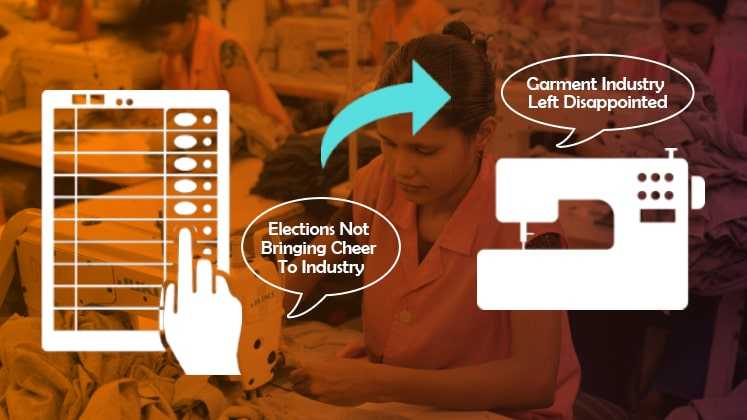General Elections 2019 kicked off on a high note in India as citizens voted for their candidates across various states, on 11th April. However, the textile and garment industry does not have high hopes as they are not the focus of any political agenda nor did they find space in the manifesto of any major party, during the election campaigns. Furthermore, very few senior leaders have promised very little for the industry. Whatever official announcements have been made so far (by the time of writing this article), have not brought cheer to the apparel manufacturers and are being considered as ‘too little or too late’!

Everyone, to whom Apparel Resources talked regarding the impact of elections, was of the opinion that regardless of whichever party comes to power, India should have a stable Government, so that the industry could survive. Advocating the same and reacting strongly to the NYAY (Nyuntam Aay Yojna) or minimum income scheme being propagated by the Congress party, Ajit Lakra, MD, Superfine Knitters, Ludhiana who is also associated with many trade bodies shared, “This scheme is faulty in its own thought process and will harm the industry like the MANREGA (Mahatma Gandhi National Rural Employment Guarantee Act) did in the past by creating an acute shortage of labour. The focus of political parties should be on ease of doing business and creating employment, not to feed people who are sitting idle.” Ajit also informed that no association or trade body of the city is supporting any political party, openly.
Association’s Affiliation
As far as associations in North India’s other hubs are concerned, Noida Apparel Export Cluster (NAEC) , one of the well-known trade bodies in the Delhi-NCR region, has come out openly to support Dr. Mahesh Sharma, MP from Noida and leader of Bharatiya Janata Party . Lalit Thukral, President, NAEC informed, “We are supporting him as he has always been very supportive and taken care of the garment industry over the years.” He further added that none of the political parties have ever asked him or the cluster for donation/funding. It is pertinent to mention here that NAEC is quite active in its liaison activities with local administration.
In Jaipur, Garment Exporters Association of Rajasthan (GEAR) President Rajiv Dewan along with members, recently had a meeting with Prakash Javadekar, Cabinet Minister for Human Resources Development and BJP Convener for Lok Sabha Elections 2019 in Rajasthan. Aseem Kumar, General Secretary, GEAR shared, “Issues related to apparel exports were shared with the Minister and were taken note of by the officials. We were also given an assurance that the same would be addressed by their Government, post-Lok Sabha Elections 2019.” In the South, Tirupur one of the biggest hubs of India has expectations, as major political parties of the city have promised that the primary demands of the cluster will be fulfilled. Raja M. Shanmugham, President, Tirupur Exporters Association (TEA) said confidently, “All local leaders are well aware of our industry’s demand and condition. We are hopeful that they will do something constructive, post-elections.”
Workers’ Absenteeism
As and when the election campaign reaches its peak, it has an impact on worker presence in factories. Across most of the hubs, apparel manufacturers shared that few workers take one or two days of leave to attend political rallies or go early in the evening to attend the same. Some of the migratory workers having their votes in their home towns, go to cast their votes. Though workers inform in advance about this, it becomes a little difficult for the factories to manage as workers go on leave for at least 8 to 10 days. Ajit added an interesting point here, “In Ludhiana, sometimes local leaders ask us to send our workers in their rallies but I never do so. Some factories however do send their workers to please or to liaison with the political person, but I would like to suggest them not to do so.”
Domestic market slow?
Few manufacturers dedicated to the domestic market shared that due to low sentiments in the market and an overall focus on elections, the domestic market is currently slow. This is not true only for the unorganised sector, but also for the top retailers who are not seeing good demand, which has an impact on apparel manufacturers too. Rahul Mehta, President, Clothing Manufacturers Association of India (CMAI), Mumbai shared, “Market was a little low from January to mid-March, but it had nothing to do with the election, but more so owing to the general market conditions. It is also true that earlier, there used to be comparatively more demand during the elections, which is missing this time. On a wider perspective, a little bit of uncertainty in the market is always there during the elections.”
Delhi-NCR: Local traders and model code of conduct!
In Delhi and few other hubs, the local market is also not untouched by the election fever. Traders are facing trouble for alleged violation of the model code of conduct. They received garment products displaying cards with the picture of Prime Minister Narendra Modi. Ashok Randhawa, President, Sarojini Nagar Market Association has filed an online complaint with Delhi election commission, in this regard.
Ahmedabad: Producing major share of election merchandise
Be it tees, caps, scarves, banners or flags, around three-fourth of fabric-based campaign material of the country is produced in Ahmedabad. More than 10 factories have an order of almost Rs. 10 crore for such material. Needless to say, that all the stuff is of poor quality due to cost barriers. Like a Tee in wholesale price would cost around just Rs. 65. Some other production hubs also have good orders of the same. “Supporters are ordering thousands of these t-shirts and distributing them for free at political rallies or to friends and families. As a result, the prices are rock bottom,” claimed a news report of Thomson Reuters Foundation, quoting a manufacturer of Delhi.

Leave a Reply